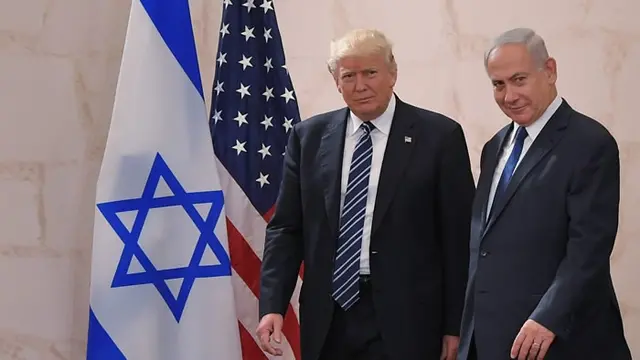US President Donald Trump is expected this week to delay relocating the US Embassy in Israel to Jerusalem from Tel Aviv, US officials and a diplomatic source said on Wednesday, despite his campaign pledge to go ahead with the controversial move.
With a deadline for a decision looming, Trump is likely to continue his predecessors' policy of signing a six-month waiver overriding a 1995 law requiring that the embassy be transferred to Jerusalem, an action that would have complicated his efforts to restart Israeli-Palestinian peace talks, the sources said.
Trump has yet to make his decision official but is required by law to act by Friday, according to one US official who spoke on condition of anonymity.
Barring a last-minute surprise, Trump is expected to renew the waiver. His administration intends to make clear, however, that Trump remains committed to the promise he made during the 2016 presidential campaign, though it will not set a specific timetable for doing so, officials said.
Asked whether Trump would sign the waiver, White House spokesman Sean Spicer told reporters on Wednesday: "Once we have a decision, we'll put it out," adding there would be "something very soon on that."
US officials told AFP they expect Trump to renew the waiver once again on Thursday, but none were willing to go on the record in case he changes his mind.
While there have been divisions among Trump's aides on the issue, the view that appears to have prevailed is that the United States should keep the embassy in Tel Aviv for now to avoid angering the Palestinians, Arab governments and Western allies while the president seeks to nurture peace efforts.
Trump avoided any public mention of a potential embassy move during his visit to Israel and the West Bank in May.
Palestinians want East Jerusalem as capital
Jerusalem was divided between Israeli rule in the west and Jordanian in the east until 1967, when Israel was attacked by allied Arab armies. Israel fought back and its victory left it in control of East Jerusalem and the wider West Bank beyond. Israel's government is based in the city, and Israeli settlements have been built around it on occupied land.
Palestinians want East Jerusalem – including the Old City and its sites holy to Muslims, Jews and Christians – to become the capital of an eventual state.
US Congress passed a law in 1995 making it US policy to move the embassy to Jerusalem, symbolically endorsing Israel's claim on the city as its capital. But the law contained a clause that has allowed each president since to issue and renew a six-month waiver on carrying out the move.
Shifting the US Embassy would be widely seen as Washington's recognition of the Israeli position on Jerusalem's status, which successive US administrations have said must be decided in negotiations between the two sides.
During his campaign for office, Trump expressed support for moving the embassy and has appointed a strong supporter of such a move as his ambassador to Israel.
Trump's administration has sent mixed signals over its intent, heightening tensions in a region where a new outbreak of unrest is rarely far away.
(CGTN)
 简体中文
简体中文





